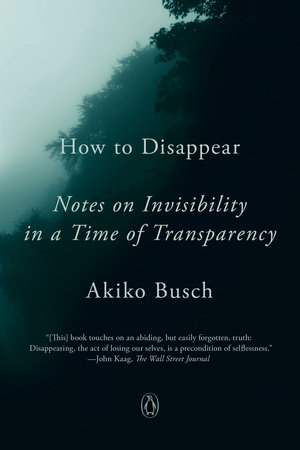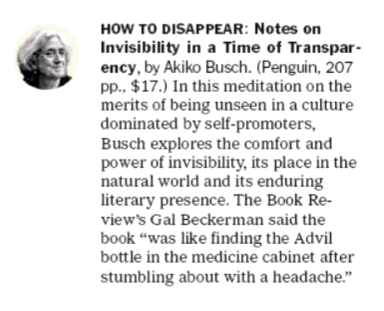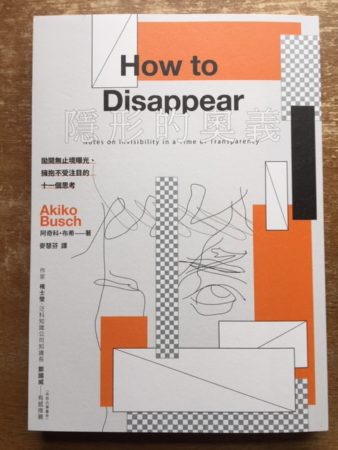How to Disappear
Notes on Invisibility in a Time of Transparency
Akiko Busch
The impulse to escape notice is not about complacent isolation or senseless conformity, but about maintaining identity, autonomy, and voice.
In our increasingly networked and image-saturated lives, the notion of disappearing has never been both more enchanting and yet fanciful. Today, we are relentlessly encouraged, even conditioned, to reveal, share, and self-promote. The pressure to be public comes not just from our peers, but vast and pervasive technology companies, which want to profit from patterns in our behavior. A lifelong student and observer of the natural world, Busch sets out to explore her own uneasiness with this arrangement, and what she senses is a widespread desire for a less scrutinized way of life–for invisibility. Writing in rich painterly detail about her own life, her family, and some of the world’s most exotic and remote places–from the Cayman Islands to Iceland–she savors the pleasures of being unseen. Discovering and dramatizing a wonderful range of ways of disappearing, from virtual reality goggles that trick the wearer into believing her body has disappeared and to the way Virginia Woolf’s fictional Mrs. Dalloway feels a flickering of personhood as an older woman, Busch deliberates on subjects new and old with equal sensitivity and incisiveness.
A unique and exhilarating accomplishment, How to Disappear is a shimmering collage of poetry, cinema, memoir, myth, and much more, which overturns the dangerous modern assumption that somehow fame and visibility equate to success and happiness. Busch presents a field guide to invisibility, reacquainting us with the merits of the inconspicuousness, and finds genuine alternatives to the typical life of perpetual exposure. Accessing timeless truths in order to speak to our most urgent contemporary problems, she inspires us to develop a deeper appreciation for personal privacy in a vast and invasive world.
Akiko Busch is the author of several essay collections, including Geography of Home, Nine Ways to Cross a River, and The Incidental Steward, published by Yale University Press in 2013 and awarded an Honorable Mention in the Natural History Literature category of 2013 National Outdoor Book Awards. She was a contributing editor at Metropolis magazine for twenty years, and her work has appeared in numerous national magazines, newspapers, and exhibition catalogs. She is on the faculty of the School of Visual Arts in New York City and lives in the Hudson Valley.
Reviews
“Almost everything that actually matters in life happens beneath the surface. Ms. Busch, who has rightly been compared to Annie Dillard and Edward Abbey, has dedicated nearly 30 years to sounding this message, one that our age seems intent on ignoring. … How to Disappear: Notes on Invisibility in a Time of Transparency serves as a gentle reminder of the wisdom of this advice … and a way to broaden the scope of the suggestion: Stop splashing and thrashing; stop confusing what is most obvious or distracting for what is genuinely important. … On the surface, How to Disappear is a palliative for the alienation that modern overexposure begets. Ms. Busch would like to save us from ourselves, from the lonely fate that afflicts Narcissus, his eyes forever locked on the only person he has ever truly loved—himself. But in its deeper moments, the book touches on an abiding, but easily forgotten, truth: Disappearing, the act of losing our selves, is a precondition of selflessness. Ms. Busch’s deeper concern is to save not Narcissus but rather the wider world his selfishness affects.” —John Kaag, in The Wall Street Journal
“Coming upon [How to Disappear] was like finding the Advil bottle in the medicine cabinet after stumbling about with a headache for a long time. … Inconspicuousness can be powerful—this may be Busch’s most radical point, especially at a moment when we’re conditioned to think power means yelling louder than everyone else in your Twitter feed, or showing the world on Instagram how you’re living your best life. … Roaming from essay to essay in a loose, associative style, following invisibility where it takes her, … Busch meanders, pulling from her array of examples a generally positive appraisal of invisibility.” —Gal Beckerman, in The New York Times Book Review (front page)
NYTBR editor Pamela Paul, shown an advance copy of How to Disappear, responded, “essentially, ‘Yes!’ Of course, this subject, now.’” (Paul and Beckerman discuss the book on the NYTBR podcast: listen here, beginning 1:45.)
How to Disappear “begins with a discussion of the atavistic delights of disappearance, pleasures that in some ways have gotten harder to come by in our age of linked-in visibility. … We are always potentially visible, and we often send out tweets or posts to ensure that someone recognizes, even likes us. All of this transparency can stoke a desire to disappear. Busch, who has previously written about reclaiming rivers by swimming across them, and about citizen science as effective environmentalism, in this book is interested in how we have devised strategies to avoid being seen. … [Sharing] her delight in the ‘menagerie of imposters,’ [Busch] concludes that ‘invisibility seems woven into the very structure of being and behavior.’ … What Edmund Burke called ‘judicious obscurity’ can be empowering. … Busch quotes the famed psychoanalyst D.W. Winnicott: ‘It’s a joy to be hidden but a disaster not to be found.’ It’s no fun at all, and indeed may be terrifying, to realize that nobody is looking for you. There is little about terror in How to Disappear, but there is a great deal about wonder.” —Michael S. Roth, president of Wesleyan University, in The Washington Post; syndicated in The (London) Independent and elsewhere
“What a mesmerizing, unexpected, and hopeful book this is. A wondrous magic hat of revelations on the power of the unseen—to disappear into, lose oneself in, and emerge transformed, with new hope for the possibility of a surer, quieter, more humane way of being.” —Jennifer Ackerman, author of The Genius of Birds
“Kafka dreamt of being a waiter. He wanted to be present but invisible. Akiko Busch has illuminated this essential part of being. Examining with a clear lyricism, what it means to protect yourself from too much visibility. Her work offers a much needed sense of balance in a time of turmoil. A reminder that we can shift and change and that there is such a thing as privacy.” —Maira Kalman
“What a perfect moment for this beautiful and affecting book. Aki Busch writes with grace, humor and breathtaking precision about the unsung virtues of blending in rather than standing out, of finding our most essential selves by losing our need to be perpetually seen. Weaving together science, myth and storytelling, anecdotes from Iceland to Grand Cayman Island, the Bay of Fundy to a virtual reality studio in Brooklyn, she reminds us that it is often in those all-consuming moments of losing ourselves—in love, in work, in the natural world—that we see and feel most acutely, that how to be depends on knowing both how to be fully present and how to disappear. This is a book that will be passed from friend to friend like a secret handshake—a must read.” —Andrea Barnet, author of Visionary Women
“What a stunning, intelligent book! And timely in these times of endless exposure. Akiko Busch leaves no pebble unturned in her contemplation of invisibility in all of its myriad guises, many of which will surprise you, and in the course of things her contemplation becomes a search for one’s place in nothing less than the flow of life itself.” —Mary Ruefle, author of My Private Property
“Fully formed and often powerful explorations of the many realms and levels of invisibility to which one might aspire or withdraw. … With a tone that is more evocative than provocative, Busch meaningfully celebrates value where it goes unseen by others.” —Kirkus Reviews
“Busch’s exploration of her subject is free-associative, wide-ranging, and poetic in its own right. … Busch offers a path to quiet dignity that is rich and enlightening.” —Publishers Weekly
“In this provocative series of essays, Busch examines how social media and the surveillance economy have redefined the way we live. She begins in the woods in the Hudson Valley, tracking the behaviour of animals we cannot see. She invokes Freud and Piaget in a chapter on childhood’s ‘invisible friends’ and visits a village in Iceland built on a 7,000-year-old lava field, believed to be home to a hidden population of elves known as the Huldufolk. She gives a moving description of her mother’s change in personality as a result of a glioblastoma brain tumour in an essay about the disappearance of self, experienced by those who suffer from diseases like Alzheimer’s, and explores virtual reality and ghosting. Throughout, she asks important questions about the consequences of hypervisibility.”—BBC.com, “Ten Books to Read This February”
“Busch demonstrates that unchosen and therefore painful versions of social withdrawal aren’t always as obvious as a bridle or a jail cell.” —Maddie Crum, The Baffler
“Busch takes the timely issue of privacy and makes it timeless.” —Jennifer Wilson, The Paris Review
“A recent article in The Atlantic, titled “The Invisibility of Older Women,” by Akiko Busch, struck a deep chord.” —Carolyn Buck, Baltimore Sun
“Busch is not looking to add a skill or new knowledge to her life. She’s trying to subtract from her existence everything potentially distracting, everything that might point back to herself; she’s trying to figure out how to be invisible. This takes her into rush hour in Grand Central Terminal to experience the ‘improvisational choreography’ of being a body among bodies, and launches a meditation on how it feels to age as a woman and to no longer be seen as a sexual object (a topic she wrote about in an essay for The Atlantic). What most struck me about the book are the moments when Busch succeeds in escaping the noise and speed of daily life. In one chapter, she takes us to a place where this is actually possible: underwater. It’s an obvious solution, but no less ingenious for that. Where else can you melt into the landscape so thoroughly—soundless, weightless, subject to the drift of the water, no emails or texts to respond to? ‘Forty feet beneath the surface, the striped parrotfish are oblivious to me,’ she writes. Listening to her own breathing, she feels that she has finally come close to achieving what she’s been pursuing: ‘We all know that sensation of life slowing down, of being suspended in time, of being outside the rhythm of ordinary life, but underwater, that is the way things really are.’” —Gal Beckerman, The Atlantic




